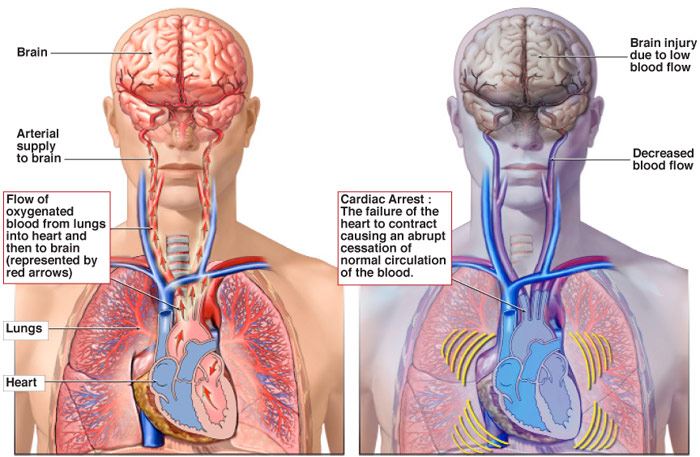Sudden Cardiac Arrest
Sudden Cardiac Arrest is a serious medical condition and requires immediate medical attention. Anyone who experiences an acute onset of chest pain, fullness, discomfort or pressure; shortness of breath; fatigue; experiences nausea, vomiting or lightheadedness should call 911 immediately. The acute onset of these symptoms could indicate the early stages of sudden cardiac arrest or of another cardiac-related condition. After calling 911, get an automated external defibrillator (AED), if one is available, and use it as soon as it arrives. Begin CPR immediately and continue until professional emergency medical services arrive. If two people are available to help, one should begin CPR immediately while the other calls 911 and finds an AED.
Sudden Cardiac Arrest (SCA) is an abrupt loss of heart function in a person who may or may not have been diagnosed with heart disease. It is triggered by an electrical malfunction in the heart that causes an arrhythmia. With its pumping action disrupted, the heart cannot pump blood to the brain, lungs and other body parts. Seconds later, a person loses consciousness and has no pulse. Death occurs within minutes if the victim does not receive treatment.
The term sudden cardiac arrest is often used interchangeably with another term, heart attack. However, these conditions are not the same. A heart attack happens due to a blockage in a blood vessel that interrupts the heart’s blood circulation. While a sudden cardiac arrest happens due to a malfunction with the heart’s electrical system. However, these two distinct heart conditions are linked as heart attacks increase the risk for SCA. Although most do not lead to SCA, when SCA occurs, heart attacks are the common cause.

Medical Illustration Copyright © 2019 Nucleus Medical Media, All rights reserved.
Causes of Sudden Cardiac Arrest
Most cardiac arrests occur when a diseased heart’s electrical system malfunctions. This malfunction causes an abnormal heart rhythm such as ventricular tachycardia or ventricular fibrillation. Some cardiac arrests are also caused by extreme slowing of the heart’s rhythm (bradycardia). However, other conditions, traits or habits may also raise your risk for the condition. These are known as risk factors and include:
Non-Modifiable Risk Factors: These factors are irreversible and cannot be changed. The more of these risk factors you have, the greater your chance of developing SCA.
- Male gender
- Can occur at any age
- Family history of SCA or inherited disorders that make you prone to arrhythmias.
- History of arrhythmias
Modifiable Risk Factors: These factors can be modified, treated or controlled through medications or lifestyle changes.
- High blood pressure
- High cholesterol
- Little to no physical activity.
- Excessive drug or alcohol abuse over many years.
Other conditions that contribute to SCA:
- Coronary artery disease
- Scarring of the heart tissue due to a prior heart attack.
- Cardiomyopathy
- Congenital heart disease
Symptoms of Sudden Cardiac Arrest
Common symptoms of sudden cardiac arrest include:
- Chest pain, fullness, discomfort or pressure.
- Discomfort or pain in one or both arms, the back, neck, jaw, or stomach.
- Lightheadedness/Fainting
- Fatigue
- Shortness of breath
- Nausea and/or vomiting
- Cold sweats
- Heart palpitations
Diagnosis of Sudden Cardiac Arrest
Sudden cardiac arrest happens without warning and requires emergency treatment. Doctors rarely diagnose SCA with medical tests as its happening. Instead, SCA often is diagnosed after it happens. Doctors do this by ruling out other causes of a person's sudden collapse with the help of the following diagnostic tests:
- Electrocardiogram (EKG/ECG)
- Echocardiogram (ECHO)
- Blood tests
- Cardiac catheterization
- Magnetic resonance imaging (MRI)
- Electrophysiology (EP) study
Treatment of Sudden Cardiac Arrest
Sudden cardiac arrest is a medical emergency (as previously mentioned). If you survive SCA, these are the following treatment options you may receive:
Medications
- Beta blockers will help lower blood pressure.
- Calcium channel blockers will help relax blood vessels and increase the supply of blood and oxygen to the heart while also reducing the heart's workload.
- Heart rate medications will help regulate your heartbeat.
